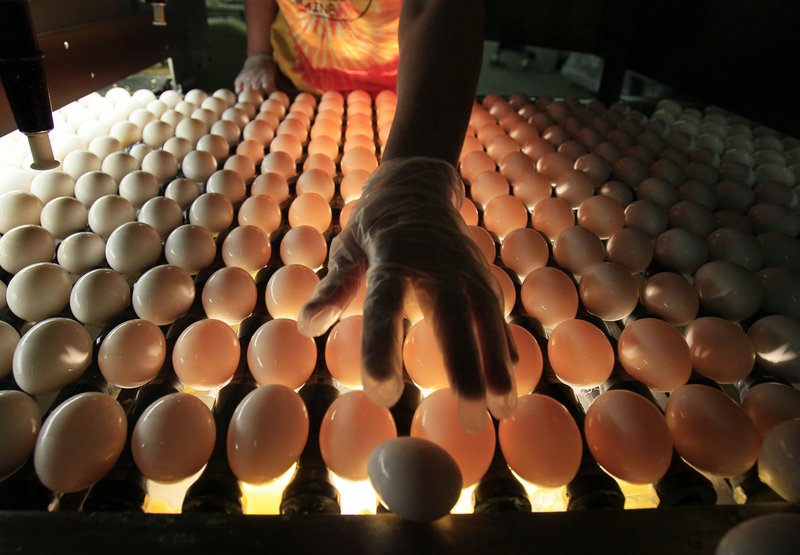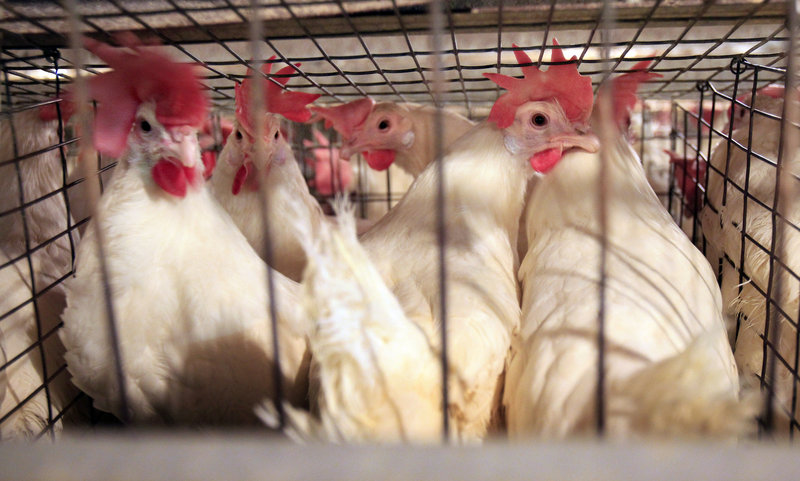TURNER – New England’s largest egg farm has weathered neighbors’ complaints about the stench and allegations of atrocious working conditions. Now it’s eager to show it’s taking good care of its hens after paying a fine to settle allegations its birds were mistreated.
Maine Contract Farming agreed last month in state court to pay $25,000 in penalties and to make a one-time payment of $100,000 to the Maine Department of Agriculture over animal cruelty allegations spurred by a hidden-camera investigation by an animal welfare organization.
Maine Contract Farming raises the hens for Quality Egg of New England. There are about 5 million hens on the Turner site, formerly known as DeCoster Egg Farm.
So far, the egg farm has spent $700,000 on improvements, consultants and training for workers, Quality Egg owner John Glessner said. The farm also is inviting neighbors this fall for a picnic and open house to see conditions for themselves.
“There’s a history there. I guess we can’t ignore it. We’ve just got to educate people and move forward,” Glessner said.
On Thursday, there were no foul odors emanating from any of the 76 barns, where the hens produce 3.5 million eggs a day. In the oldest of the buildings, built by Jack DeCoster in 1967, the hens in cages appeared healthy. There were four hens in each cage, giving each about 67 inches of space.
The birds eat from automated feeders, and their droppings are cleared away by machinery.
Likewise, their eggs are collected in chutes and removed on conveyors to one of eight processing plants, where automated equipment washes, scrubs and sanitizes them before weighing and sorting them. The eggs are packaged and placed in refrigerators within 16 hours of the egg being laid in the barn next door.
This farm that seemed so tranquil on a cool summer day is the same farm that was investigated by the state for denying access to teachers, social workers and doctors, and was fined $3.6 million by the Occupational Safety and Health Administration over workplace conditions in 1996.
Labor Secretary Robert Reich described it as an “agricultural sweatshop.”
The latest flap was generated when Ohio-based Mercy for Animals released video shot at the farm that showed workers swinging hens by their necks; sick and injured hens in cramped cages; and decomposing carcasses and rotting eggs in cages alongside healthy hens.
The farm hired consultants to make recommendations to ensure birds’ health. What’s good for the birds is good for the bottom line, they said, because maintaining biosecurity and keeping birds healthy makes sound business sense.
Don Hoenig, Maine state veterinarian, likes what he’s seen in the year since the animal welfare group released its video and state agents raided the farm.
“They have made significant progress over the past year, and we’ve been monitoring that progress on a regular basis with visits,” he said.
Nathan Runkle, executive director of Mercy for Animals, said things are improving at the Maine farm, but he won’t rest until cages are eliminated.
“We hope that Quality Egg will be a true leader in the industry by phasing out these cruel and restrictive cages where birds are unable to spread their wings, walk or engage in natural behavior, and that they’ll move toward cage-free systems,” he said.
Send questions/comments to the editors.




Success. Please wait for the page to reload. If the page does not reload within 5 seconds, please refresh the page.
Enter your email and password to access comments.
Hi, to comment on stories you must . This profile is in addition to your subscription and website login.
Already have a commenting profile? .
Invalid username/password.
Please check your email to confirm and complete your registration.
Only subscribers are eligible to post comments. Please subscribe or login first for digital access. Here’s why.
Use the form below to reset your password. When you've submitted your account email, we will send an email with a reset code.